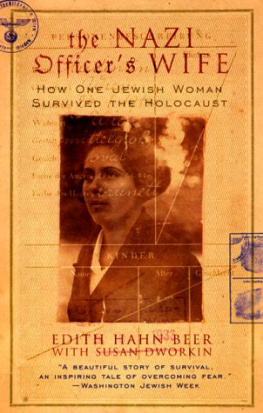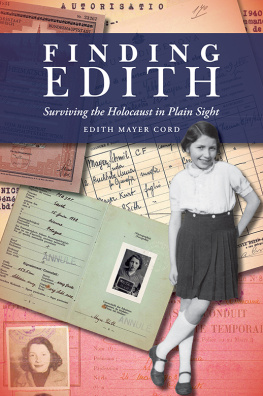A FTER A WHILE , there were no more onions. My coworkers among the Red Cross nurses at the Stdtische Krankenhaus in Brandenburg said it was because the Fhrer needed the onions to make poison gas with which to conquer our enemies. But I think by thenit was May 1943many citizens of the Third Reich would have gladly forgone the pleasure of gassing the enemy if they could only taste an onion.
At that time, I was working in the ward for the foreign workers and prisoners of war. I would make tea for all the patients and wheel it around on a little trolley, trying to smile and give them a cheery Guten Tag .
One day when I brought the teacups back to the kitchen to wash, I interrupted one of the senior nurses slicing an onion. She was the wife of an officer and came from Hamburg. I believe her name was Hilde. She told me the onion was for her own lunch. Her eyes searched my face to see if I knew that she was lying.
I made my gaze vacant and smiled my silly little fools smile and went about washing up the teacups as though I had absolutely no idea that this nurse had bought her onion on the black market especially to serve to a critically injured Russian prisoner, to give him a taste he longed for in his last days. Either thingbuying the onion or befriending the Russiancould have sent her to prison.
Like most Germans who defied Hitlers laws, the nurse from Hamburg was a rare exception. More typically, the staff of our hospital stole the food meant for the foreign patients and took it home to their families or ate it themselves. You must understand, these nurses were not well-educated women from progressive homes for whom caring for the sick was a sacred calling. They were very often young farm girls from East Prussia, fated for lifelong backbreaking labor in the fields and barns, and nursing was one of the few acceptable ways by which they could escape. They had been raised in the Nazi era on Nazi propaganda. They truly believed that, as Nordic Aryans, they were members of a superior race. They felt that these Russians, Frenchmen, Dutchmen, Belgians, and Poles who came into our clinic had been placed on earth to labor for them. To steal a plate of soup from such low creatures seemed not a sin but a perfectly legitimate activity.
I think we must have had more than ten thousand foreign prisoners in Brandenburg, working in the Opel automobile factory, the Arado airplane factory, and other factories. Most of those whom we saw in the hospital had been injured in industrial accidents. While building the economy of the Reich, they would mangle their hands in metal presses, burn themselves in flaming forges, splash themselves with corrosive chemicals. They were a slave population, conquered and helpless; transported away from their parents, wives, and children; longing for home. I did not dare to look into their faces for fear of seeing myselfmy own terror, my own loneliness.
In our cottage hospital, each service was housed in a separate building. We on the nursing staff ate in one building, did laundry in another, attended to orthopedic cases in another and infectious diseases in yet another. The foreign prisoners were rigorously separated from German patients, no matter what was wrong with them. We heard that one time, a whole building was allocated to foreigners suffering from typhus, a disease that comes from contaminated water. How they had contracted such a disease in our beautiful historic citywhich had inspired immortal concertos, where the water was clean and the food was carefully rationed and inspected by our governmentwas impossible for simple girls like us to comprehend. Many of my coworkers assumed that the foreigners had brought it on themselves, because of their filthy personal habits. These nurses managed not to admit to themselves that the disease came from the unspeakable conditions under which the slave laborers were forced to live.
You must understand that I was not really a nurse but rather a nurses aide, trained only for menial tasks. I fed the patients who could not feed themselves and dusted the night tables. I washed the bedpans. My first day on the job, I washed twenty-seven bedpansin the sink, as though they were dinner dishes. I washed the rubber gloves. These were not to be discarded like the thin white gloves you see today. Ours were heavy, durable, reusable. I had to powder their insides. Sometimes I prepared a black salve and applied it to a bandage and made compresses to relieve the pain of rheumatism. And that was about it. I could not do anything more medical than that.
Once I was asked to assist at a blood transfusion. They were siphoning blood from one patient into a bowl, then suctioning the blood from the bowl and into the veins of another patient. I was supposed to stir the blood, to keep it from coagulating. I became nauseated and ran from the room. They said to themselves: Well, Grete is just a silly little Viennese youngster with almost no education, the next thing to a cleaning womanhow much can be expected from her? Let her feed the foreigners who have chopped off their fingers in the machines.
I prayed that no one would die on my watch. Heaven must have heard me, because the prisoners waited for my shift to be over, and then they died.













